-
Fréderic Louf: 18 Years Old and Rising (2011)
FRÉDERIC LOUF: 18 YEARS OLD AND RISING (2011)
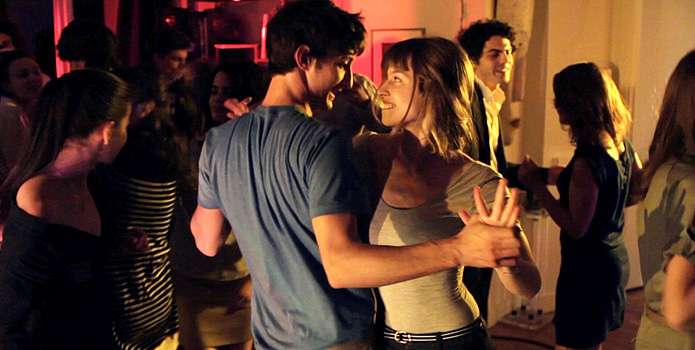
PIERRE NINEY IN 18 YEARS OLD AND RISING
Class comedy
Frédéric Louf's smart political comedy about the Upper Bourgeoisie in the time of Mitterand skewers both snobby rich kids and the working class boy who sets out to enjoy them and then falls for a self-centered girl. The laughs are physical as well as witty and dominated by the Comédie-Française's skinny, nimble, talented youngest male member Pierre Niney as Primo Bramsi, a supposed school failure with dash who despises his provincial florist father and neglects to pay the rent on his tiny Parisian chambre de bonne -- but keeps bouncing back and surprises his prof by passing his bac.
Primo isn't political. He's a free-wheeling, picaresque character, almost a Felix Krull, who will say anything to get ahead. Watching him improvise is a giddy pleasure. Coming back to Paris after a short, disastrous visit to his parents, he crashes a party given by some snobby rich Parisian kids and though his shoes fall apart, the girls fall for him. He falls hopelessly for the insufferably self-centered Gabrielle (Lou de Laâge), though it's the quirky Delphone (Audrey Bastien) who may want him the most. Gabrielle does invite Primo to summer with her and her family in Saint-Tropez, but she quickly disinvites him when he gets beaten up by some right wing toughs and the bruises on his face make him look like a raccoon. Appearances are everything for these silly young snobs.
Louf, who co-wrote (with Régis Jaulin) and directed this debut romantic farce, heightens the sociopolitical emphasis by setting its events in 1981 when the socialist François Mitterand is just getting elected President, beginning a 13-year period when the communists were invited into the government and the right wing was in a continual state of alarm and outrage. Primo's pal at his building is a young Arab with natural leftist leadings called Malik (Ali Marhyar) who has told him to vote for Mitterand, but that never happens, though Primo's friendship with Malik survives his flirtations with the pampered rich.
After being banished by Gabrielle, Primo is invited back by Gabrielle's rich boyfriend to a wine party for which Primo blows all his rent money, 1800 francs, for a bottle that will impress her friends -- he gets a 1961 Chateau La Conseillante, which is worth $2,700 today. But when Malik is shocked at this waste Primo opens the bottle and drinks it with Malik up on the roof, later refilling the bottle with 10-franc plonk from the supermarket to take to the party. The rich boys know it's not La Conseillante because Malik threw away the cork, but are fooled into thinking it's good stuff.
Part of the fun of 18 Years Old and Rising is the way Primo keeps getting away with everything: it's a celebration of the durability and sociopolitical flexibility of youth, and Neney (who has a droll cameo in Guédiguian's new film, also in the Rendez-Vous, The Snows of Kilimanjaro), seems made of shape-holding rubber. His character jumps into fistfights at a moment's notice and often threatens to jump out of windows, which he occasionally makes good on. He accordingly spends much screen time all bruised or limping. But the real victims are the rich kids whose received prejudices are continually skewered. Miriaculously and rather inexplicably, Primo passes his bac and his philosophy prof stands him to a bottle of good champagne. Both of the rich girls still seem to like him, his Arab friend doesn't hate him and the rich boys keep looking sillier and sillier. If you're leanings are anti-youth or pro-money, none of this is going to taste very sweet.
The combination of politics, history, and romantic comedy is reminiscent of last year's French US art house hit, Michel Leclerc's The Names of Love, which substitutes for the victorious Mitterand the defeated Lionel Jospin and is set twenty years later and whose nimble comic is a female one, Sara Forestier. Leclerc's film is more layered, but Louf's is purer, simpler fun. Premiere compares Niney to Louis Garrel, and he does resemble Garrel's more madcap, crazy side, only skinnier. Niney was nominated for the Jeune Espoir Masculin (Most Promising Male Actor) award at the 2012 Césars for this performance.
Suiting its wild summer mood, J'aime regarder les filles opened in Paris July 20, 2011 to fair reviews (Allociné 2.9): some didn't get the joke. The film has also aired at several festivals, including Toronto in September 2011.
The French title is taken from Patrick Coutin's 1981 hit. The film is included in the March 1-11, 2012 joint UniFrance and Film Society of Lincoln Center series, Rendez-Vous with French Cinema. Public screenings will be:
Mon., March 5, 6pm – IFC; *Sat., March 10, 3:45pm - WRT
*In person: Frédéric Louf
Last edited by Chris Knipp; 10-12-2020 at 10:13 PM.
-
David and Stéphane Foenkinos: Delicacy (2011)
DAVID AND STÉPHANE FOEKINOS: DELICACY (2011)
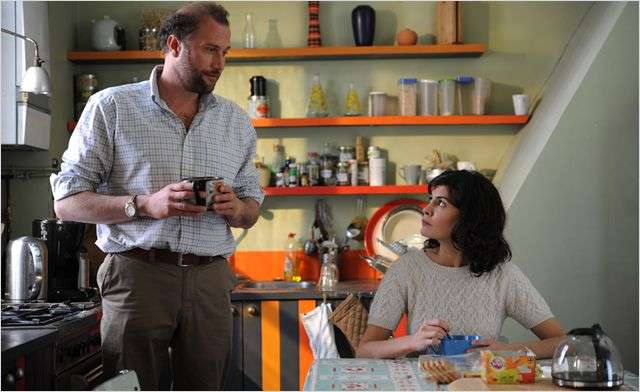
FRANÇOIS DAMIENS AND AUDREY TAUTOU IN DELICACY
A widow's quirky romance
Audrey Tautou stars in this melodrama-as-rom-com about a recent widow who gets involved with a seemingly inappropriate coworker. The screenplay slowly introduces this situation through a host of drawn out and calculated set-up scenes. The point is to dispose of the husband so the bereaved wife can fall into her confused affair. Delicacy seems to mean taking a very long time to get where a classic comedy would take us in a jiffy. Perhaps something has been lost in the translation by these first-timer brothers of David's bestselling novel. Anyway for some reason it's necessary to have a full-fledged meet-cute with soon-to-be-gone hubby François (Pio Marmai) and Nathalie (Tautou) -- it involves his voiceover and her choice of apricot juice at a café. Then he proposes -- using a key ring as a pledge. Then there has to be a wedding in the snow captured in a whirling dolly shot. The cute voiceovers continue with a (mercifully) quick scene showing the pair, legally a couple now, in bed. No baby yet, they decide -- that would doubtless hamper the widow's romance, though the decision to delay children unwittingly underlines the fact that Tautou is not so young as she used to be. It's over a decade since her success in Amélie. Hasn't her ticket on the ingénue train expired by now?
Finally François goes out for a jog. At last! He's going to get killed. Only not quite. First there must be a pointless hospital sequence. But now last he's out of the way and the story can begin.
Nathalie puts her life back together, only just: her job interview with the Swedish-based company she's going to work for involves a pointlessly predatory boss, Charles. He's played by the usually sultry and mysterious Bruno Todeschini, miscast here as a blatant bore. He will persist in pursuing Nathalie despite her declared lack of interest, and will tell another coworker that she's a real Yoko Ono, capable of breaking up the world's biggest rock group. This is the movie's concept, which it attempts to foist upon us. The action does not bear this out. No one is interested in Nathalie, except Charles, and maybe, a shlubby Swedish guy. Several years inexplicably pass, and Nathalie inexplicably grabs the Swedish guy, Markus. He is played by the excellent François Damiens, the first cast member allowed to introduce a little nuance. Markus is an oddball, because he's not handsome or pretty like Nathalie, François and Charles, and he's weird, because he's Swedish.
No worries, because Markus speaks perfect French, not surprising since Damiens (recently seen in Heartbreaker, with Romain Duris) is Belgian. Nathalie gives Markus a French kiss, and then the confusion can begin.
But what is the confusion? It seems to be general, but so unfocused it's hard to care about it. Nathalie tells Markus she was thinking of something else, and has no idea why she kissed him. Nonetheless they start dating. He thinks he may be falling in love with her, or will soon because it's Paris and the Eiffel Tower is right behind them flashing those sparkly lights at night, another one of the movie's predictable, manipulative scenes. But he's also not sure he's in love with her and thinks maybe he shouldn't be. She isn't in love with him. But they go on dating. Charles finds out, and tries to intrude. Is that, and his drunken evening with Markus, supposed to be funny? This is really hard to say.
Delicacy/La Délicatesse -- or its story -- may deserve credit for attempting to be different, and even for suggesting romance need not be with a handsome, prepossessing guy (Markus does however repeatedly show that he has a good sense of humor). This is a good role for François Daniens (how, though, can we imagine him to be Swedish?); but one actor worth watching in a film is not quite enough. One must still make allowances (though the film's look is quite classic and glossy) for these first-timer Foenkinos brothers' making some missteps in telling their already successful story. There are blatantly derivative moments, including a bereaved street song for Nathalie that's a tepid echo of Honoré's Love Songs. But this still seems a film that's often tedious and inexplicable. From the start it indulges in button-pushing, it pushes its quirkiness too hard (nothing "delicate" about either of these), and it has a shaky sense of pace. It seems the filmmakers were not sure enough of themselves. None of this seems to get in the way of popular box office success, necessarily. La Délicatesse has been well received in France -- it opened there just before Christmas 2011 -- though the critics did not love it very much (Allociné 2.5 indicates mediocre reviews).
Delicacy is the closing night film for the March 1-11, 2012 joint UniFrance and Film Society of Lincoln Center series, Rendez-Vous with French Cinema. Two screenings at that time:
*Sun., March 11, 6pm & 9pm - WRT
*In person: David & Stéphane Foenkinos and Audrey Tautou
A UK release is scheduled for April 12, 2012.
Last edited by Chris Knipp; 02-21-2012 at 08:58 PM.
-
Lucas Belvaux: 38 Witnesses (2012)
LUCAS BELVAUX: 38 WITNESSES/38 TÉMOINS(2012)
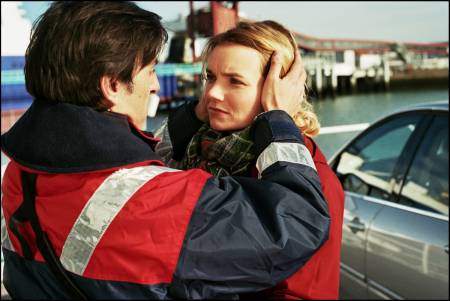
SOPHIE QUINTON AND YVAN ATTAL IN 38 WITNESSES
Bad witnesses
Lucas Belvaux's Rapt, starring Yvan Attal, considered the moral ironies in a rich executive's kidnapping when his bad prior behavior emerges. In 38 Witnesses/38 Témoins the Belgian-born director known for his brilliant multi-genre Rashomon-style Trilogy tackles another moral issue. He adapts a novel by Didier Decoin, Est-ce ainsi que les femmes meurent ? ("Is This How Women Die?") based on the 1964 Kitty Genovese case of the woman in Queens whose rape and murder 38 witnesses were aware of but never called to report. The setting has been moved to Le Havre -- not the quaint, humanistic version given us in Aki Kaurasmäki's recent film, but anything but. Belvaux's filmmaking here is severely elegant, with some small sense of imploding Greek tragedy in it. And yet it's hard to care, and some of the emotion seems pushed. This Le Havre is gray and off-putting in harbor, building, and street, the objective correlative of soullessness and a frozen moral sense. While Rapt was an intense thriller, 38 Witnesses (again starring Attal) is rather static, a long wait to find out that people didn't do anything, which we already knew. It's a grim, depressed film, impressive but without emotional impact. Belvaux has a great command of style, but one begins to see a cool indifference in his work.
Belvaux's digital widescreen images of cold-colored harbor industrial spaces and big cargo ships and a pilot boat roaring through a wintry sea are grand and terrifying and beautiful. They made me think of the much more layered and complex Adieu by Arnaud des Pallières, which also deals with moral responsibility (it combines the issues of Rapt and this and much more). Belvaux's shipping images, which show the power of the sea and of freight vessels, exude a sense of helplessness, especially through the effective use of sound design, which makes water and engines oppress us and seem alive -- more alive than any of the people in the film.
Pierre (Attal) is a harbor pilot, and he works at night; he lives in a spacious flat, gray like everything else, with big windows. It overlooks the place where a girl was brutally murdered. Her screams rang out. One man heard them and yelled; he is the only one at first who admits to police that he saw. Pierre's fiancee Louise (Sophie Quinton) works in shipping too, but she returns from a trip to China at the end of the fatal night.
The local journalist exploring the case, Sylvie Loriot (Nicole Garcia, as good as she can be in a conventional role) comes to question people, but at first only Louise will talk to her. Louise assumes Pierre didn't hear the violence, as he at first claims. But he has a doomed, grim look. He predicts the end of their relationship. It's all over before it's begun.
Everything in the film goes like this. It's all a foregone conclusion. What are we here for? To have the witnesses' cowardice and lying revealed. But we already know about them. To brood over the wrongness of it all.
On another night the increasingly desperate, guilt-ridden Pierre (who does he think he is, the murderer?) delivers a painfully overwrought, though whispered, soliloquy as he sits near the sleeping Louise that in effect finishes off the film by removing whatever element of naturalism or dramatic truth it might have contained. It may have seemed necessary to explicate his sense of guilt at having heard everything and gotten up and looked and then still done nothing, but the whispered speech exemplifies 38 Witnesses' art-film lack of realism and ordinary detail. Everything is grandly, coldly staged; nothing is naturalistic and specific. Is this what Belvaux has always done? The cold relentlessness worked splendidly in Rapt, but here, it's the kiss of death, because we need to see little people feeling guilty and responsible. Instead we get a grandiose sense of doom.
Louise is sleeping but "hears" the soliloquy and thinks it's a dream, but Pierre confesses it's true. His next step is to go to the police. The commissioner's first choice is not to do anything because there are too many guilty people to prosecute. But then an uneasy cop (François Feroleto) tells Sylvie and she writes the silent witness story. This forces the cops to go back to the people in the building, who admit they had lied when they said they heard nothing. The cops stage a "recreation" of the crime and the witnessing of it and then Louise, who had pledged to stay by Pierre, announces that she is leaving him.
Belvaux is at the top of his game, but in things that don't matter. A frantic drive around the port by Louise looking for Pierre is superfluous, but has terrific rhythm and visual style. A man alwyas staring at Pierre from a balcony across the street is silly but elegantly shot. But these are pointless gestures, and the essential is missing. A curious casualty of the storytelling is the police procedural aspect, which is barely touched on -- except for the few final minutes, which are terrifying and yet somehow seem thrown away, almost an afterthought, an obligatory gesture and nothing ore, however well done.
The stars of 38 Witnesses, despite the well-meaning efforts of Nicole Garcia and Yvan Attal, are the great container ships and the dockyard cranes and the big apartment buildings with their disquieting spaces and sounds, the digital cameras with their excellent lenses manned by dp Pierric Gantelmi d'Ille, and the mikes manned by Henri Morelle that have caught the sounds of the sea and engines and cries of the victim and someone reenacting her final ordeal.
38 Témoins will be released in France March 14, 2012. It debuted at Rotterdam, where it was the opening night film, and was screened for this review at the Walter Reade Theater at Lincoln Center in preparation for the UniFrance-Film Society of Lincoln Center Rendez-Vous with French Cinema, where it will be shown to the public three times at two locations, the IFC Center and the Walter Reade Theater:
Fri., March 2, 7pm – IFC; Sat., March 10, 6:15pm – WRT; Sun., March 11, 1:30pm – WRT
Last edited by Chris Knipp; 09-28-2015 at 05:49 PM.
-
Laurent Achard: Last Screening (2011)
LAURENT ACHARD: LAST SCREENING (2011)
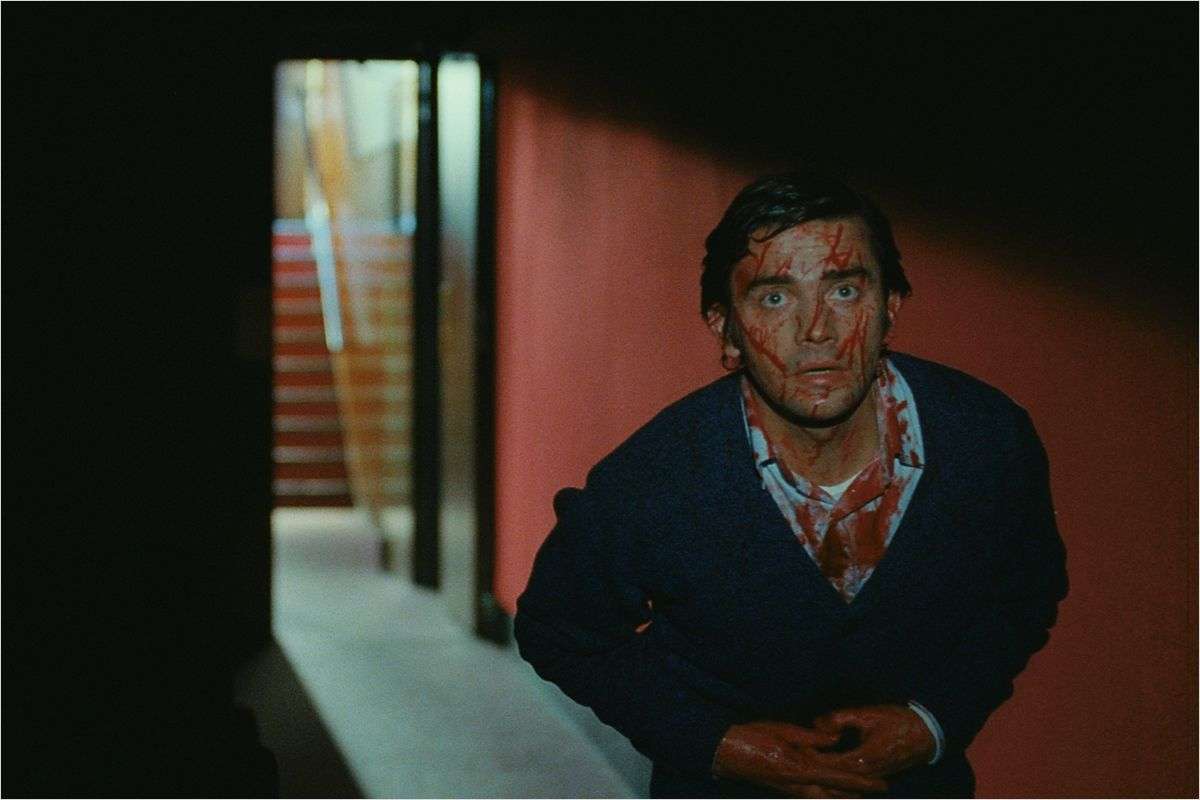
PASCAL CERVO IN LAST SCREENING
Auteurist slasher film
In Laurent Achard's third feature, Sylvain (the sweaty, haunted-looking and quick-to-tear-up Pascal Cervo) runs a small provincial French rep cinema and lives in the basement, a hiding place for piles of cinephile mementos that once belonged to his mother. In his spare time he murders women and cuts off their ears, complete with earring, to adorn old star photos tacked on his walls. But maybe this should not be taken to literally. As Variety critic Leslie Felperin comments, Dernière séance "plays like a private joke best shared among movie buffs." The real aim is not to tell a horror story so much as to riff off of Peeping Tom, Psycho, and various other cult films, to create a strange amalgam of art film and sleazy slasher flick. "Cinema Paradiso meets Psycho" is the rather random series blurb phrase. One may be reminded of other films about movie houses, such as Jacques Nolot's gritty and personal Porn Theater or Federico Veiroj's gentle, humanistic A Useful Life, in which the cinema is also threatened with closing. Last Screening is a perfect effort for late night hipsters, but mainstream art house clients will be horrified if they wander in. In France it appealed most to the critics for the cinephile mags, Cahiers du Cinéma and Les Inrockuptibles. The latter saw it as a blend of Argento and Bresson.
Sylvain's Empire Cinema is about to be closed down. The owner, who redid it in 1978, is going to turn it into a shop and Sylvain has to move out. The implication is that this crisis causes Sylvain to go off the deep end and begin his series of murders, losing all ability to distinguish between reality and the films he loves, and entering into his own B-horror sequence. Meanwhile he avoids harsh reality by continuing to show one film a day, running the projector, selling the tickets, and cleaning the seats afterward and letting in a handful of loyal customers such as Monsieur Paul (Noël Simsolo and a woman playing the lead role in Racine's Phèdre, Manon (Charlotte Van Kemmel), who has a romantic interest in him. In his free time he roams around killing young women. Sometimes older ones, like the female cabbie he encounters at a kind of karaoke theater, played by Brigitte Sy, former lover of Philippe Garrel and mother of Louis Garrel. She drives Sylvain out to the suburbs to the house where he grew up. Then he offs her.
Before this Sylvain, who usually dons a hooded coat for his exploits, offs a drum majorette practicing in a stadium and various others. Overwrought flashbacks show young Sylvain (Austin Morel) and his brutal mother (Karole Rocher), who's harshly running him through some memorized lines for what may be an audition. "Mamon dearest" (to use Felperin's line) evidently is the cause of both Sylvain's hatred of women and his obsession with classic female stars. One of Sylvain's victims finally gets the better of him and as he dies of stab wounds, he staggers through the projection room and manages to watch the last scenes of Jean Renoir's French Cancan, the film he's most recently been screening for customers for six euros.
The Last Screening debuted at Locarno (August 2011) and played at London and other film festivals, including Rotterdam (January 2012). It opened in Paris cinemas December 7, 2011 to rather mediocre reviews (Allociné 2.8) overall; but many critics acknowledged that Achard has a distinctive style and that his blend of auteurist/cinephile and horror themes is unique and "bears fruit." The film is included in the UniFrance-Film Society of Lincoln Center March 1-11, 2012 series, Rendez-Vous with French Cinema, and was watched for this review at a press screening at Lincoln Center. Public screenings at the Rendez-Vous will be:
*Tues., March 6, 8:30pm – WRT; *Thurs., March 8, 6pm – IFC; *Sat., March 10, 1:30pm – WRT
*In person: Laurent Achard, Pascal Cervo and producer Sylvie Pialat
-
Benoît Jacquot: Farewell, My Queen (2012)
BENOÎT JACQUOT: FAREWELL, MY QUEEN (2012)
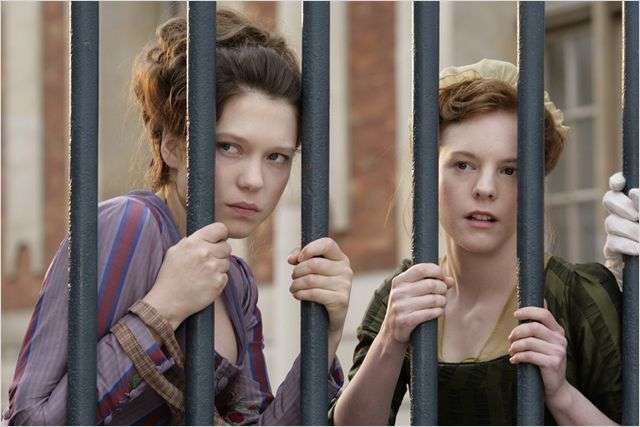
LÉA SEYDOUX AND JULIE-MARIE PARMENTIER IN FAREWELL, MY QUEEN
The French Revolution from an odd angle
History books often ring false because they're narrated from an omniscient point of view that favors great men and power. Farewell, My Queen/Les Adieux à la reine, a 2002 Prix Fémina-award-winning novel by Chantal Thomas adapted by Benoît Jacquot, seeks to describe Versailles at the precise moment of the storming of the Bastille and the chaotic days thereafter (July 14-17, 1789) from the viewpoint of a very minor insider -- the "reader" for Marie Antoinette (Diane Kruger). Sidonie Laborde (Léa Seydoux) lives in a humble room at Versailles; her only possession of value is a nice clock. Ironically, Seydoux herself is a real film princess, being granddaughter and niece of the combined ruling Gaument-Pathé cinema families. Sidonie is nobody, but due to her job she regularly spends time alone with the Queen of France, whom she idolizes and is dedicated to serving. By being situated on the edge of great events instead of staring at them head-on we are enabled to view a key moment of French history from a new angle. The advantage is that the picture provided feels more authentic. And like Sofia Coppola, Jacquot had the privilege of shooting actually at Versailes: the glittering hallways and gilded and chandeliered rooms enfilade are the real stars of the show.
The disadvantage of Thomas' narrator is that she's limited and unreliable: she's blinded by her super-loyalty and her minor role in the court provides only fleeting views of main events. But Jacquot, whose filmography is uneven, nonetheless scores a relative success here by handling the material simply. He relies on a sure-fire mix of candlelight and gowns, wise old men and beautiful young women. He even throws in one sexy young man, a fake Italian called Paolo (Vladimir Consigny) who mans a gondola and sings in Italian but is really a French nobody, like Sidonie, whom he meets and makes a play for. They are all ready to get it on in a hallway, but it's a sign of how chaotic and frightening events have become that even that quick youthful coupling is interrupted.
Sidonie enjoys the friendship of a denizen of the royal records, Jacob Nicolas Moreau (Michel Robin), an historian and ardent royalist (though we aren't told that). She takes directions from Madame Campan (Noémie Lvovsky), first lady of the bedchamber (who wrote memoirs of Marie Antoinette, though that's not mentioned either). Jacquot's film is a succession of swift scenes in which moments of chaos and growing terror at court alternate with the routine frivolities. Rome is burning, the court is fleeing -- and the faithful few are sewing. Sidonie and her colleague Honorine (Julie-Marie Parmentier) continue to work on an embroidery of a dahlia to delight the Queen. Marie Antoinette (author Thomas perhaps riffing here off the many libels cooked up against the Queen later as pretexts for her execution) nurtures a virtually open lesbian attraction for the Duchess Gabrielle de Polignac (Virginie Ledoyen). The Duchess, in her special green silk gown symbolizing hope, envy, and a dozen other things, is far more interesting to the Queen than the plump, pasty-faced Louis XVI (Xavier Beauvois), and, unfortunately for Sidonie, eclipses her in the Queen's affections as well.
The best scenes are the ones in the dark corridors behind the halls and mirrors and great rooms enfillade where aristocrats and servants, increasingly confused about who is which, hover clutching candles and trading rumors of who has fled and who has been offed by the revolutionaries.
Approaching the events crabwise captures the curious mixture of order and disorder that doubtless indeed prevailed. Rumor is how people know what is going on. The physical "pamphlet" listing 200-odd aristocrats who must be beheaded is read by an aristocrat (Jacques Nolot) in the chaotic jumbled corridor amid the flickering candlelight. Madame Campan says this must be kept secret. It's later given to Marie Antoinette and she throws it into the fire. She decides to flee to Metz (and gives orders for items to bring including a coffee pot, teapot, and chocolatière), but the King's decision to remain at Versailles and go to Paris alone frustrates that hope. Several scenes not involving Sidonie are still from her POV: we see Marie Antoinette and the Duchess de Polignac alone together because Sidonie is spying through a doorway. Anyway this is a film of atmosphere and suggestive glimpses rather than action. The point is that the rulers, used to trivial pursuits, have no real idea how to act in the crisis. Threatened with beheading, the Queen burns love letters and gathers her jewels. Sidonie's world is crumbling but she still focuses all her efforts on gaining more favor with her mistress. The story dutifully provides a kind of surprise ending for Sidonie that does not end her indirect link with the higher-ups.
The film maintains well its sense of disorder and panic -- the latter unnecessarily underlined with constant tremulous mood music. One would need a novel or a mini-series to convey fully the complexities of mind and personality behind this young woman narrator, who like all the rest is only glimpsed but clearly is as smart and well-read and crafty as she is loyal. The end result of the focus on a zigzag of fleeting moments is that the viewer is intrigued but not much moved.
Benoît Jacquot's Farewell, My Queen/Les adieux à la reine, a French-Spanish coproduction, was the opening night film at Berlin 2011. It opens in French cinemas March 21, 2012, and was watched for this review at a press screening for the March 1-11, 2012 UniFrance-Film Society of Lincoln Center series, Rendez-Vous with French Cinema. Public screeings of the film at the Rendez-Vous at the Walter Reade Theater (WRT) at Lincoln Center and the IFC Center in lower Manhattan:
*Fri., March 2, 6:30pm – WRT; *Sat., March 3, 1:30pm – WRT; *Sat., March 3, 7pm – IFC; *Sun., March 4, 6pm – BAM
*In person: Benoît Jacquot
Last edited by Chris Knipp; 07-13-2012 at 12:28 PM.
-
Muriel, delphine coulin: 17 girls (2011)
MURIEL, DELPHINE COULIN: 17 GIRLS (2011)
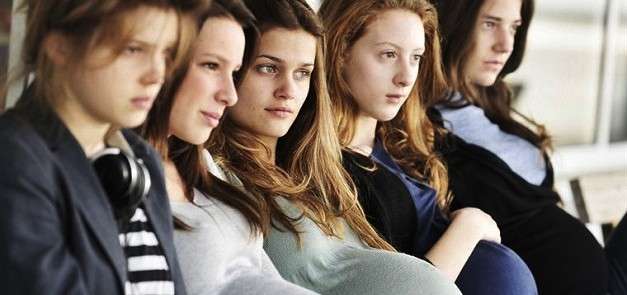
SOLÈNE RIGOT, JULIETTE DARCHE, LOUISE GRINBERG, ROXANNE DURAN, ESTHER GARREL IN 17 FILLES
Teen baby club in a French coastal town
From the sister team of Muriel and Delphine Coulin comes this first feature set in their home town of Lorient in Brittany based on a 2008 American news story about 17 girls at a Gloucester, Massachusetts high school who allegedly made a pact to get pregnant and raise their children together. The reporter who wrote the original story later made a documentary revealing there in fact was never any "pregnancy pact" among girls at the school. There were simply 18 unwed girls no older than 16 who got pregnant at Gloucester High that year -- an only slightly higher number than usual. The French film has been well received both for its cautionary social message and its warm performances and several memorable scenes. With its pretty jeunes filles en fleur and its luminous pastels by skilled dp Jean-Louis Vialard (who has worked with Apichatpong Weerasethakul and Christophe Honoré) strongly reminiscent of Joel Meyerowitz's photography classic, Cape Light, this is a film that's easy on the eyes. It seems unfortunate that a film aiming to bring home truths to the French audience is based on a false premise, is thin on background about the girls and lacks follow-up on what happens after the babies are born. Could they not have begun by getting the details right? But whether myth or reality, 17 filles is watchable and thought-provoking.
The town of Lorient has in common with Gloucester being a one-time port that is economically depressed, and teen pregnancies tend to be high among the poor. Another common feature is a lack of realism among pregnant teens about what child rearing will be like. That was true at Gloucester High and it's true among the girls of Lorient. The lycée girls see no future for themselves as adults in their town, and banding together in the intense friendship of teenage girls, they imagine a utopian commune in which they will raise their kids together, free of annoying adult pressure. 17 filles makes clear that this does not happen, though apart from the mishaps that occur to several of the girls, what does happen is not detailed.
In contemporary society poor girls can make their social errors with the firm illusion that they're exercising free will in so doing. And in 17 Girls its Camille (Louise Griberg of The Class), the prettiest, most clearly Alpha female of the lycée girls, who first proudly announces to her best mates up on the dunes that she's pregnant. She's the trend-setter. When the rejected girl Florence ((Roxanne Duran) claims she's pregnant too, her declaration gets her membership in Camille's five-girl inner circle. Getting pregnant becomes a gesture of defiance and a symbol of belonging to the in-group. The willingness of teenagers to self-sacrifice in order to belong has never been better dramatized.
There are funny scenes, like when a group of girls, once the project to get collectively enceinte has been agreed to, shock a clerk when they buy a large number of pregnancy tests at a pharmacy. As the school nurse, the ubiquitous Noémie Lvovsky (the madam in House of Tolerance and also in Guilty and Farewell, My Queen in 2012's Rendez-Vous) adds a note of bemusement and. . . tolerance. A gathering of school officials debate what the sudden rash of pregnancies means. When confronted by irate parents, who blame the school, the principal (Carlo Brandt) simply insists neither he nor the llycée is responsible.
Meanwhile the individual dramas play out. At a summer dance, girls determine to make boys get them pregnant. Given that the girls in the cast are all pretty, it's not surprising they succeed, except for one who later offers a boy 20, 30, then goes up to 50 euros for him to impregnate her. Camille's single mom (Florence Thomassin) is extremely angry. So are other parents who run a café. There are some good scenes between Camille and her brother, who has become a soldier in Afghanistan. The relationship between Camille and her brother is the only male-female relationship of any depth. Camille has an on-and-off boyfriend who proves loyal at the end, but otherwise no boys are present for the pregnant girls, one of the odd and implausible aspects of the film.
17 Girls was included in the Critics Fortnight at Cannes and received high marks from Paris critics when it entered cinemas December 14, 2011 (an excellent Allociné 3.8 rating). Reservations about the accuracy of the story can't detract from the fact that this is, as the French reviews nearly all say, a first film that is a warm and sunny and justifiably troubling "success." This might be contrasted however with the more probing exploration of teeange girls found in the films of Céline Sciamma (Water Lilies, Tomboy).
Delphine Coulin is also a novelist and her sister Muriel is a documentary filmmaker.
The film is included in the Unifrance-Film Society of Lincoln Center March 1-11, 2012 series, Rendez-Vous with French Cinema. Public screening schedule:
*Fri., March 2, 9:15pm – WRT; *Sat., March 3, 9:30pm – IFC; *Sun., March 4, 1pm - WRT
*In person: Delphine and Muriel Coulin
Last edited by Chris Knipp; 02-23-2012 at 11:50 PM.
-
André Téchiné: Unforgivable (2011)
ANDRÉ TÉCHINÉ: UNFORGIVABLE (2011)
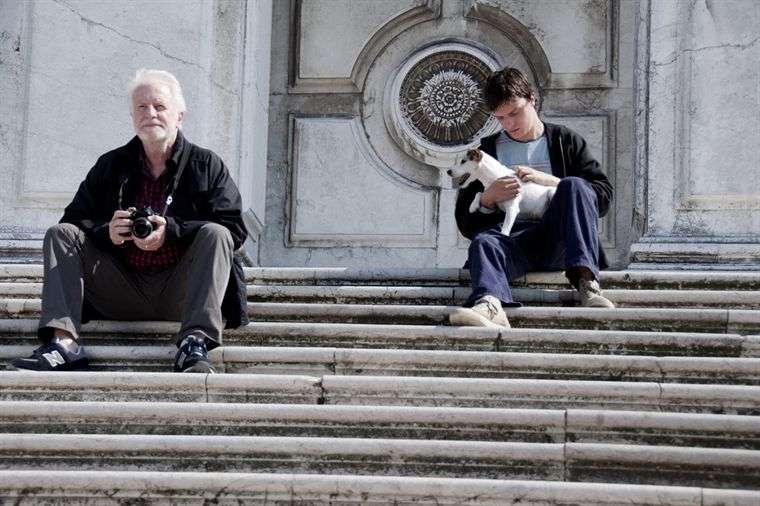
ANDRÉ DUSSOLLIER AND MAURO CONTE IN UNFORGIVABLE
Téchiné, a bit off form
Unforgivable is adapted from a novel by Philppe Dijan (whose 37°2 le matin was the basis for Beineix's Betty Blue). In this new source Téchiné finds favorite themes: family tensions, amorous transgressions, personal doubts. He assembles an interesting cast including André Dussollier, Carole Bouquet, Adriana Asti. They deliver fresh, energetic performances, and are joined by young hopefuls like Mélanie Thierry and Mauro Conte, who also show how good Téchiné is with actors. The underlying theme from the novel by Dijan, something about a writer who gets blocked when he's in love, along with other implausible plot elements, doesn't go down nearly as well as the performances. This is recognizably personal work. But Unforgivable doesn't sing and excite us like the great Téchiné films of the Eighties and Nineties. The themes don't cohere and the action seems artificial.
What's wrong to begin with, is Venice, the setting, which requires people who alternately speak French and Italian, but don't seem particularly wedded to the locale. Though it's nice that this Téchiné Venice stays away from tourist traps and is not a cliché, it's a pity that it is not also in some way more atmospheric, mysterious, magical, or even ugly. And no amount of motorboats or instructions on tailing somebody along the canals can change that.
Venice may have a lot of real estate agents, but a French one, called Judith (Carole Bouquet), is a stretch. Likewise her being approached by a French mystery story writer, Francis (André Dussollier) who has come to write a book. This was not the setting of the novel (which was the Basque coast), and feels like Woody Allen coming to a new location to liven up his filmmaking routine. Dussollier takes a house out on Sant'Erasmo island, on condition that Judith moves in with him. That's even more of a stretch; the suggestion gives her a nosebleed. But a year and a half later they are married and living there together. Only it turns out Francis is happy now, and when he's happy he can't write. So: writer's block. Francis' daughter Alice (Thierry), an aspiring actress who's married with a child, comes to visit, and then disappears. Francis engages a semi-retired female detective, Anna Maria (Asti), an old flame of Judith's, it seems, who goes off to Paris, to trail Alice. She turns out to be perfectly happy, if irresponsible, having an affair with a shady young Venetian, Alvise (Andrea Pergolesi), the son of an impoverished countess (Sandra Toffolatti). Alvise is a small time drug dealer, as, it turns out, is Anna Maria's son Jérémie (Mauro Conte; his father was French, you see), but Alvise is an "aristo," which Jérémie definitely isn't.
Francis now becomes suspicious that Judith is having an affair and hires Jérémie, just back from jail on drug charges, to follow her. Jérémie doesn't want to and isn't trained to but can't say no because he needs the money. Judith is soon onto Jérémie. They connect and have a brief affair. But Jérémie is also depressive, and, for obscure reasons (homosexual panic?), a gay basher. Despite the moment on the grass with Judith, he does not want sex with men or women, and even dislikes touching people. Francis for a while becomes involved with Jérémie and helps, even saves him. This might be the most important moment of the film, but it happens and is over a little too quickly.
The blocked Francis is always spying on and examining things, looking through binoculars, a magnifying glass, taking photos of everything, like a tourist; he says it helps him in his writing (what writing?). He's trying to get to the bottom of something, evidently, but there's no there there. And there's something pretty nasty that happens with a dog. Anna Maria, an alcoholic and chain smoker, returns to Venice, diagnosed in Paris as terminally ill.
Working with screenwriter Mehdi Ben Attia, who collaborated on Far, Téchiné has modified the novel's first-person narration to present events from multiple viewpoints as in The Witnesses and Changing Times. This definitely makes the film more Téchiné-like, but the tangled strands don't cohere as they might. This could be for several reasons: the corny writer-in-love-and-unable-to-write theme; Francis' inexplicable jealousy; the fact that the two young Italian men Jérémie and Alvise, are shadowy as well as shady figures whose torments or delights never seem to matter. It's hard to think of any really crucial moment, and the pivotal relationship between Francis and Judith, which is arbitrarily set up and keeps being interrupted, lacks emotional resonance. The turning point is the novel Francis writes when his writing block lifts. Due to his jealousy he and Judith have been estranged, but when the book is done, Francis goes to her and she seems welcoming. This is not an emotional shift that feels convincing.
It's nice that this film has at the center a romance of older people. Judith is well into her fifties and Francis well into his sixties. But his sudden, offhand proposal and later marriage and subsequent jealousy and estrangement, followed by reunion after a book's done, all seem like literary gimmicks. The plot line of Unforgivable doesn't, finally, convince.
And in this context Carole Bouquet and André Dussollier, consummate pros though they may be, turn out to be a chilly combination. One longs for Catherine Deneuve, or the great cast Téćhiné assembled for The Witnesses, or Magimel or Binoche, or Amalric, or Auteuil, or the young hotties in Wild Reeds, Élodie Bouchez, Gaël Morel, Stéphane Rideau -- all those wonderful characters, interesting actors, people we could care about.
At his best Téchiné has woven complex plots whose interrelations one deeply pondered and wanted to understand, as in Wild Reeds or Les Voleurs, or explored an individual story that seemed to matter, as in I Don't Kiss, or followed multiple stories that are part of the same important historical moment, as in The Witnesses. Here it is difficult to see what the different story lines have to do with each other or why they matter. There's a Téchiné feel, but not a Téchiné importance. And the reason all this ultimately disappoints so much is that Téchiné has, in the past, made films that really did matter. But this can't be totally dismissed because Téchiné's misfires provide worthwhile commentary on his successes.
André Téchiné's Inpardonnables debuted at Cannes and opened in Paris August 17, 2011, receiving not very enthusiastic reviews (Allociné 2.6). Critics saw the film as long, repetitious, and running breathlessly along too many narrative paths (I'm paraphrasing Cahiers). It has been picked up for US distribution by Strand Releasing. The film is part of the Rendez-Vous with French Cinema March 1-11, 2012 (a joint enterprise of UniFrance and the Film Society of Lincoln Center), slated for the following screenings:
*Wed., March 7, 2012, 6:30pm – IFC; *Fri., March 9, 8:45pm – WRT
*In person: Carole Bouquet
Last edited by Chris Knipp; 02-25-2012 at 06:50 AM.
 Posting Permissions
Posting Permissions
- You may not post new threads
- You may not post replies
- You may not post attachments
- You may not edit your posts
-
Forum Rules





 Reply With Quote
Reply With Quote






Bookmarks